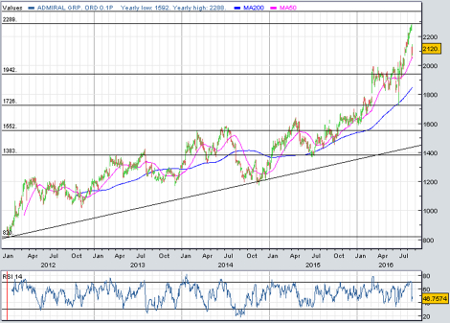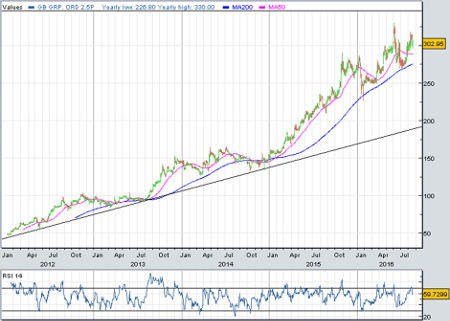Insider: Sell, sell, sell
19th August 2016 12:10
Profits ahoy, Admiral
bounced back sharply after the financial crisis, but a savage profits warning in 2011 smashed the shares. It's taken them almost five years to recover that lost ground, although a rally since late 2014 now leaves them close to record highs.
Colin Holmes, made a non-executive director in 2010, piled into the shares in August 2011, buying 10,000 at an average price of £13.50. Three months later he snapped up another 15,000 at 890p. His wife paid 888p a pop for 15,000.
Now, their faith has been rewarded with a significant windfall. Holmes' wife Linda has just offloaded 16,500 shares at just under 2,089p, trousering over £344,000. It could have been £27,000 more, however, with the price having slumped from 2,254p the day before this week's half-year results.
That's the biggest share price fall since the 2011 warning. But were the results that bad? Well, the owner of price comparison website Confused.com made record turnover and profit. It increased the customer base by 11% to over 3.5 million and raised prices by an average of 3%.

The problem was a sharp drop in its solvency ratio - a new set of rules governing the amount of capital European insurers must hold to reduce the risk of insolvency. Admiral's fell from 206% at the end of 2015 to 180% six months later. It blamed a sharp drop in interest rates, which increased the regulatory valuation of the UK car insurance business claims liabilities.
That's still well above the 100% figure at which an insurer can demonstrate it has enough capital to meet all its liabilities. However, it does mean that the company may return less surplus cash to shareholders. It has reduced estimates of surplus cash to return to shareholders over the next two to three years from £150-200 million to £100-150 million.
UBS is unconcerned. Analyst James Shuck still thinks the shares are a 'buy' and worth a possible 2,339p. A forward price/earnings (PE) ratio of 19.5 for 2016 is not cheap, but then a nice dividend yield of 6% rarely is these days.
GB Group identifies selling opportunity
Worth less than 20p a share in 2009, ID intelligence specialist is another company within a whisker of a record high, this time at over 300p.
The temptation to bank some profits is understandable. After their meteoric rise, the shares trade on over 31 times forward earnings, not cheap despite a forecast earnings per share compound annual growth rate (CAGR) of 14% out to 2018.
Broker finncap thinks that kind of growth justifies a price target of 350p, but finance and operations director Dave Wilson isn't listening. He and his wife Cath have just sold 54,133 and 49,999 shares respectively at 303p, netting more than £315,000. Neither is non-executive director Richard Linford who made over £104,000 offloading 34,363 at the same price.
It's never wrong to take a profit, of course, and both sets of sellers still own 295,592 and 270,183 shares respectively.

The sales come just three weeks after retiring chief executive Richard Law and his wife sold 750,000 shares at 293p. He's promised not to sell any more of his remaining 1.3 million shares in the "near future".
In June, GB raised £25 million from a share placing at 275p to fund the acquisition of IDscan Biometrics, a firm whose software can help authenticate documents like passports, visas, ID cards and driving licenses.
It's hardly a bargain, but finnCap analyst Lorne Daniel thinks it's a smart move, strengthening both the verification and fraud solutions offering and market position.
This article is for information and discussion purposes only and does not form a recommendation to invest or otherwise. The value of an investment may fall. The investments referred to in this article may not be suitable for all investors, and if in doubt, an investor should seek advice from a qualified investment adviser.
Editor's Picks